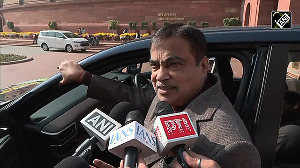It was the first such meeting between Congress Working Committee member Manmohan Singh and Dravida Munnetra Kazhagam president M Karunanidhi [the two parties were electoral partners in 1980, 11 years before Singh joined active politics as finance minister], yet the two quickly sealed an alliance.
While the tie-up had been taken for granted even before the DMK quit the Bharatiya Janata Party-led National Democratic Alliance, the speed with which the Congress dispatched Singh to Chennai was not expected.
This despite party president Sonia Gandhi calling up Karunanidhi on new year's eve and congratulating him on quitting the NDA.
The Congress was anxious about the Nationalist Congress Party breaking away in Maharashtra and its inability to attract partners in northern India. Another reason that set the Congress thinking was the Pattali Makkal Katchi's decision to rethink its continuance in the central government on January 12, and party founder Ramadoss' decision to call on Karunanidhi later that day, they said.
If the first two issues weakened the Congress' claim as a party capable of replacing the BJP as the ruling coalition leader, the PMK's rethink gave a second, or even a third option to the DMK.
With Samajwadi Party chief Mulayam Singh Yadav unmoved even after Gandhi's declaration that the issue of prime ministership could be decided later, and NCP president Sharad Pawar opening talks with the rival BJP-Shiv Sena combine in Maharashtra, the Congress badly needed a strong ally to show up to the rest of the country.
Tamil Nadu and DMK fitted the bill, particularly after the All India Dravida Munnetra Kazhagam showed the way for the rest of the country by aligning with the BJP ahead of the 1998 general election.
With no hopes of an alliance with the AIADMK after Chief Minister J Jayalalithaa pilloried Gandhi on the foreign origin issue more than once, the Congress feared the possibility of being pushed into a three, if not a four-cornered contest in the state.
It could not afford the risk.
Though the Congress still commands a sizable vote-bank in the state, given the political realities in neighbouring Kerala, even the Left parties would have found it difficult to have a one-to-one alliance in Tamil Nadu in the absence of a Dravidian facilitator.
That would have meant a possible alliance involving the Marumalarchi Dravida Munnetra Kazhagam, PMK and the Left. The AIADMK would have become the main rival, with the Congress and the BJP left to fend for themselves.
The BJP may still face that possibility; the Congress did not want to risk it.
Some Congress leaders were keen to delay the alliance talks with the DMK in order to pressure Karunanidhi into yielding more seats.
One of them argued: "As much as we need the seats, the DMK needs to trounce the AIADMK locally. After all, the Congress is still the third largest political force in the state, and the DMK had yielded the TMC [Tamil Maanila Congress] 20 Lok Sabha seats both in 1996 and 1998, before the breakaway party merged with the Congress parent."
The DMK also had and continues to have -- reservations about factionalism in the state Congress. Worse still, the party suspects that some Congress factions, including the one led by Tamil Nadu Congress Committee president G K Vasan, are close to the AIADMK.
The DMK would not be surprised if the Congress factions use the seat-sharing issue as an excuse to split the party at the very last minute and join the AIADMK, or if only to deny the Karunanidhi-led combine a clean sweep as in 1996.
Certain disgruntled sections of the Congress may also use the Rajiv Gandhi assassination issue against the DMK, MDMK and PMK.
Singh met state Congress leaders and obtained from them an assurance that they would work together for the victory of all the alliance parties and candidates.
It remains to be seen how many of them stick to their promise.
The PMK too was toying with the idea of positioning itself as the 'deciding factor'. But the lukewarm response of the AIADMK and apprehensions that the DMK might go without it if it tried to act smart has forced Ramadoss' hands.





